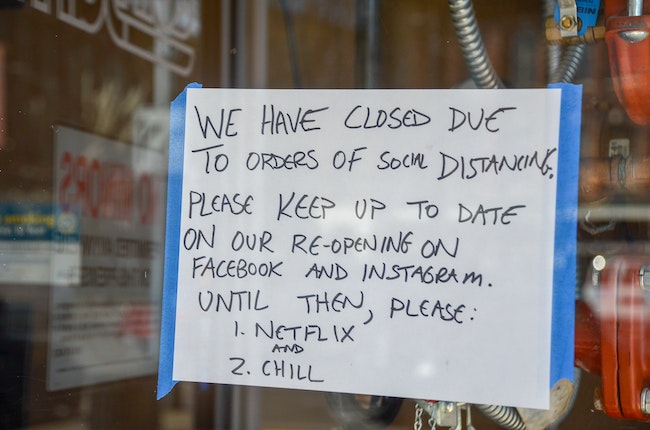
A sign in the window of Coin Jam on March 17, 2020 announcing a closure during the COVID-19 pandemic (Rachel Alexander/Salem Reporter)
NOTE: Salem Reporter is providing free access to its content related to the coronavirus as a community service. Subscriptions starting at $5 a month help support this.
A team of Oregon’s top government and business leaders are looking at every state program and agency to confront the economic erosion created by the outbreak of COVID-19.
On Tuesday, Gov. Kate Brown convened her 28-member Coronavirus Economic Advisory Council that comprises the heads of state agencies, executives of Oregon’s major business groups, leaders of labor unions and local government organizations.
The council’s purpose charge is to identify ways to mitigate factors adversely affecting Oregon’s economy. Of particular interest is how a four-week suspension of all gatherings of more than 25 people, as well as a ban of on-site consumption of food and beverage at restaurants, bars and other establishments will affect businesses and workers across many sectors.
The council will work with the Special Joint Committee on Coronavirus Response that met for the first time on Wednesday, March 18.
“There was consensus that protecting public health is the primary objective in the middle of this thing,” said Christian Gaston, co-chair of the council and workforce policy advisor to Brown. “After we’ve taken those necessary measures, anything we can do to get cash into the hands of affected workers and affected businesses is probably the number one priority.”
According to Gaston, the council is turning over every stone and searching every couch cushion for dollars to help businesses and employees facing hardship, but Oregon’s only mechanism for relief is using its own revenue system. In contract, the federal government can borrow and got into debt to fuel national economic measures to stabilize Americans’ personal finances.
Gaston said the importance of the federal stimulus package being developed by the Trump administration and Congress can’t be overstated.
“We are working through every state program where we can to provide flexibility to people, but that stimulus is really the role we’re hoping the federal government will play,” he said.
Sandra McDonough, executive director of Oregon Business and Industry, echoed Gaston’s comments. She told the Coronavirus Response Committee that infusing cash into Oregon’s businesses is a high priority. She shared two anecdotes of companies losing thousands of dollars in revenue. One was a Portland-area event space that lost $42,000 in revenue after having to cancel all events in the coming four weeks. Another was a firm that provides security for events that lost out on $106,000 in revenue in just a few days.
“These companies across Oregon are experiencing severe cash flow issues,” she said. “Particularly with small businesses, you don’t typically tend to have a lot of cash on hand, so if your monthly revenue dries up, you’re in a world of hurt.”
The council is considering several steps to help Oregonians but hasn’t yet recommended specific actions. The possibilities range from helping cover rent, ensuring child care and food aren’t threatened and ensuring health care is available to low-income Oregonians.
Protecting health care workers is another critical aspect of the council’s plan as it works with with federal authorities to tap reserve stocks of personal protective equipment and boost manufacturing of that gear.
Gaston said that capitalizing on use of the state’s unemployment fund to pay out a large number of claims will be crucial to providing relief for those laid off and temporarily out of work.
A state Employment Department spokesperson said Wednesday they weren’t sure of the exact dollar amount of that fund, but the agency believes there’s a healthy cushion to absorb the increase number of unemployment claims being submitted.
Gaston wants Oregonians to understand there will be no one solution to the economic problems. The needs of rural Oregonians are very different than those of workers in the Portland metro area. The same goes for Oregonians of color. Protecting the various demographics will include providing support for undocumented and non-English speaking workers throughout the state.
Council member Graham Trainor — president of one of the state’s largest labor unions, Oregon AFL-CIO — told lawmakers Wednesday that using an equity lens when searching for solutions to help Oregon’s employers and employees is important so that nobody is left behind.
“This crisis brings to light some of the cracks in the gaps in our safety net, but it is important to remember that those cracks are most severe and lasting for workers of color, immigrant workers and other vulnerable communities,” Trainor said. “We must not make policy changes that will erode protections for low-income workers, or our critical safety net, without them.”
a better idea of what further needs Oregonians have and begin to act quickly to fulfill them.
Here’s a full list of the council’s membership:
Governor’s office staff
· Christian Gaston, Co-chair, governor’s workforce policy advisor
· Leah Horner, Co-chair, governor’s regional solutions director and jobs/economy policy advisor
· Shannon Singleton, governor’s housing policy advisor
State government representatives
· Chris Cummings, executive director, Business Oregon
· Todd Davidson, CEO, Travel Oregon
· Keith Leavitt, chief commercial officer, Port of Portland
· Alexis Taylor, agency director, Department of Agriculture
· Kay Erickson, agency director, Oregon Employment Department
· Margaret Salazar, agency director, Oregon Housing and Community Services
· Mark McMullen, state sconomist, Office of Economic Analysis
· Ben Cannon, executive director, Higher Education Coordinating Commission
· Andrew Stolfi, insurance commissioner, Division of Financial Regulation
· Lou Savage, agency director, Department of Consumer and Business Services
· Erin Seiler, legislative director, Bureau of Labor and Industry
· Mark Gregory, state director, Small Business Development Center
Business representatives
· Jason Brandt, president and CEO, Oregon Restaurant and Lodging Association
· Sandra McDonough, executive director, Oregon Business & Industry
· Duncan Wyse, president, Oregon Business Council
· Andrew Hoan, president and CEO, Portland Business Alliance
· Jenny Dressler, legislative counsel, Oregon State Chamber of Commerce
Labor representatives
· Jeff Anderson, secretary-treasurer, United Food and Commercial Workers Local 555
· Graham Trainor, president, Oregon AFL-CIO
· Melissa Unger, executive director, Service Employees International Union Local 49
· Stefan Moritz, secretary-treasurer, Unite Here
· Reyna Lopez, executive director, Pineros y Campesinos del Noerste
Local government Representatives
· Gina Nikkel, executive director, Association of Oregon Counties
· Mike Cully, executive director, League of Oregon Cities,
· Scott Cruickshank, general manager of visitor venues, Metro/MERC









